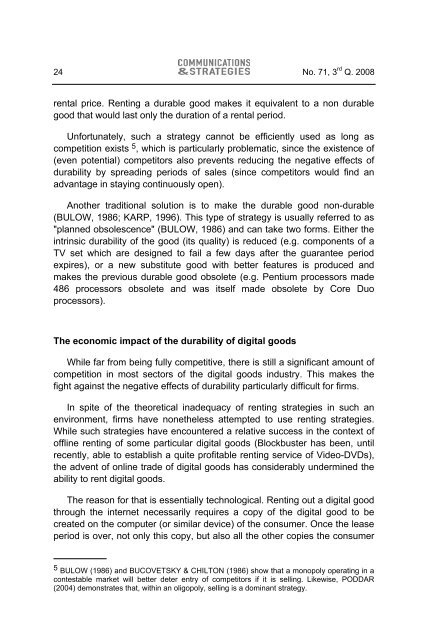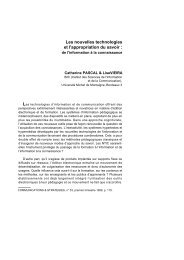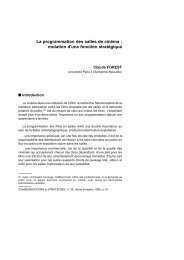The Nature of Digital Goods - Idate
The Nature of Digital Goods - Idate
The Nature of Digital Goods - Idate
You also want an ePaper? Increase the reach of your titles
YUMPU automatically turns print PDFs into web optimized ePapers that Google loves.
24 No. 71, 3 rd Q. 2008<br />
rental price. Renting a durable good makes it equivalent to a non durable<br />
good that would last only the duration <strong>of</strong> a rental period.<br />
Unfortunately, such a strategy cannot be efficiently used as long as<br />
competition exists 5 , which is particularly problematic, since the existence <strong>of</strong><br />
(even potential) competitors also prevents reducing the negative effects <strong>of</strong><br />
durability by spreading periods <strong>of</strong> sales (since competitors would find an<br />
advantage in staying continuously open).<br />
Another traditional solution is to make the durable good non-durable<br />
(BULOW, 1986; KARP, 1996). This type <strong>of</strong> strategy is usually referred to as<br />
"planned obsolescence" (BULOW, 1986) and can take two forms. Either the<br />
intrinsic durability <strong>of</strong> the good (its quality) is reduced (e.g. components <strong>of</strong> a<br />
TV set which are designed to fail a few days after the guarantee period<br />
expires), or a new substitute good with better features is produced and<br />
makes the previous durable good obsolete (e.g. Pentium processors made<br />
486 processors obsolete and was itself made obsolete by Core Duo<br />
processors).<br />
<strong>The</strong> economic impact <strong>of</strong> the durability <strong>of</strong> digital goods<br />
While far from being fully competitive, there is still a significant amount <strong>of</strong><br />
competition in most sectors <strong>of</strong> the digital goods industry. This makes the<br />
fight against the negative effects <strong>of</strong> durability particularly difficult for firms.<br />
In spite <strong>of</strong> the theoretical inadequacy <strong>of</strong> renting strategies in such an<br />
environment, firms have nonetheless attempted to use renting strategies.<br />
While such strategies have encountered a relative success in the context <strong>of</strong><br />
<strong>of</strong>fline renting <strong>of</strong> some particular digital goods (Blockbuster has been, until<br />
recently, able to establish a quite pr<strong>of</strong>itable renting service <strong>of</strong> Video-DVDs),<br />
the advent <strong>of</strong> online trade <strong>of</strong> digital goods has considerably undermined the<br />
ability to rent digital goods.<br />
<strong>The</strong> reason for that is essentially technological. Renting out a digital good<br />
through the internet necessarily requires a copy <strong>of</strong> the digital good to be<br />
created on the computer (or similar device) <strong>of</strong> the consumer. Once the lease<br />
period is over, not only this copy, but also all the other copies the consumer<br />
5 BULOW (1986) and BUCOVETSKY & CHILTON (1986) show that a monopoly operating in a<br />
contestable market will better deter entry <strong>of</strong> competitors if it is selling. Likewise, PODDAR<br />
(2004) demonstrates that, within an oligopoly, selling is a dominant strategy.





